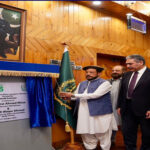When the media reported that Islamabad was considering the merger of Gilgit-Baltistan (GB) with Pakistan, one expected all hell to break loose in Indian administered Kashmir (IaK) with the separatist conglomerate univocally denouncing this arbitrary decision. One had also expected that the Hurriyat would immediately call for an emergent meeting of its constituent members to discuss this shocking development and come out with a stern warning to Islamabad that this proposal was completely unacceptable as it violated both the UN resolutions and the aspirations of the Kashmiris.
However, nothing of this sort happened and it seemed that the separatist amalgam was more worried about the martyrs’ memorial in Pulwama rather than Islamabad’s proposal of making GB the fifth province of Pakistan province! Luckily, three days after this news broke Jammu and Kashmir Liberation Front (JKLF) chairman Yasin Malik made his opposition to this proposal public through an ‘open letter’ to Prime Minister Nawaz Sharif. Thereafter Hurriyat (G) chairman SAS Geelani too followed suit and voiced his objections. Unfortunately, the separatist amalgam did not consider this unusual development with extremely serious implications worthy of a joint declaration of condemnation.
The JKLF chairman deserves appreciation for being the first to react to the GB merger proposal and reminding Prime Minister Sharif that he had “no moral right to make (a) policy that will adversely affect the future of millions of Kashmiris” by changing the constitutional status of GB. Yet, even though he is extremely fond of invoking the UN resolutions on Kashmir in support of his arguments, the ‘open letter’ addressed to Sharif by Malik surprisingly doesn’t highlight the fact that under the UN resolutions on Kashmir, Islamabad’s proposal to merge GB with Pakistan would be illegal. Instead, the JKLF chairman has sought to emphasise that “If Pakistan imposes its sovereign writ over Gilgit Baltistan, India will then have a political and moral right to integrate Kashmir with it. With one stroke, Pakistan will be helping India to consolidate its writ over Kashmir.”
What Malik has stated certainly makes sense. However, by choosing to play the ‘India card’ instead of highlighting the fact that UN resolutions preclude any unilateral change in the status of GB, the JKLF chairman has himself downplayed the importance of the UN resolutions on Kashmir. Thus, in a way he has unwittingly endorsed New Delhi’s stand that the UN resolutions on Kashmir are no longer relevant. Malik’s emotional appeal minus any specific reference to the UN resolutions on Kashmir also conveys the impression that he does not want to run the risk of antagonising Islamabad by outrightly stating that its GB merger proposal is ultra vires.
In keeping with his outspoken nature, Hurriyat (G) chairman SAS Geelani has voiced his concern regarding the GB merger proposal by making it clear that since the entire J&K is a disputed territory, taking over any part of this territory by Pakistan without the consent of its people is in clear violation of the UN resolutions on Kashmir. Unfortunately, instead of making this fundamental issue the basis of his argument, Geelani sahib too has brought in the ‘India factor’ by saying that the GB merger proposal will negatively impact the “disputed nature of Jammu and Kashmir and serve as a ‘certificate’ to India for its illegal and forced occupation of this State.”
The tragedy is that the Hurriyat often become victims of our self created contradictions. When New Delhi says that the UN resolutions on Kashmir are no longer relevant, our leaders feel extremely offended. However, as we have seen, the Hurriyat (G) and JKLF chairmen have themselves made light of the UN resolutions on Kashmir by attaching far more importance to the benefits the GB merger proposal would give India rather than emphasising that this proposal violates UN resolutions on Kashmir. Our leaders maintain that Kashmir is an ideological issue and not a territorial dispute. However, rather than taking support of the UN resolutions while debating the GB merger issue the Hurriyat leaders have instead focused on the possible advantage in terms of territorial gains that implementation of this proposal might give India vis-a-vis Pakistan. Consequently, the separatists are themselves contradicting their stance on the Kashmir issue by giving it the semblance of a territorial dispute between India and Pakistan rather than an ideological issue!
Just because there has been no further development regarding the proposed GB merger proposal and some writers have held that construction of the China-Pakistan corridor would not be illegal under international laws, the separatist leadership cannot afford to become complacent. The example of how India’s objection to construction of the Mangla Dam in Mirpur (PaK) in 1957 was rejected by the international community has been cited a knowledgeable author. While I have no legal expertise to comment on this, I feel that this precedent may no longer be relevant since what the Kashmir issue meant to the international community in 1957 and how it perceives it in 2016 is as different as chalk from cheese!
Surely, legal experts in both Pakistan and China would have minutely examined this issue and thereafter come to a conclusion that there was no other option for Islamabad but to float the GB merger proposal inspite of the adverse effect it may have on the Kashmir issue. The reality is that while Kashmir is an emotive issue for Pakistan, the China-Pakistan corridor is an economic one and with $46 billion at stake, neither Beijing nor Islamabad can take any chances. Thus, while Islamabad loses nothing if the Kashmir issue remains in an indeterminate state, it can’t afford to delay implementation of the China-Pakistan corridor proposal for economic reasons. And this is why the GB merger proposal should be incessantly worrying our leaders.
The fact that Islamabad kept the Hurriyat in the dark about its GB merger proposal is disturbing. However, what is more alarming is that despite this, none of our leaders have had the courage to voice their objection on Islamabad’s unilateral decision regarding a territory that is an indisputable part of J&K. This development also reveals that despite Islamabad’s claims of considering the Hurriyat as the “true representatives” of the Kashmiris as well as an indispensible “stakeholder” in Kashmir is a bluff. And so is its charade of consulting the Hurriyat and keeping this amalgam informed on Kashmir related matters.
However, for this sorry state of affairs, the separatists have nobody else but themselves to blame since the Hurriyat has willingly accepted a passive role while dealing with Pakistan and so it is no great wonder if Islamabad doesn’t take the separatist conglomerate seriously. Just last month, while commenting on the non-inclusion of Hurriyat leaders in the proposed Indo-Pak talks, the JKLF chairman had expressed his anguish by saying that “Despite the fact that our presence in the dialogue progress was mandatory, we came to know about it (non-inclusion of Hurriyat) from news channels and newspapers.” And just a month later, the Hurriyat once again learnt about Islamabad’s GB merger proposal from newspapers and news channels!
Therefore, in order to get the respect it deserves, the Hurriyat seriously needs to refurbish its image. This would require our leaders to exert their independence more forcefully and behave in a manner that makes it clear to Islamabad that the Hurriyat is not subservient to Islamabad. More importantly, it needs to dispel the wrong impression that the Hurriyat is a tool for managing and promoting Pakistan’s interests in Kashmir. This can only be done by extending its campaign for demanding the ‘right to self determination’ to the whole erstwhile kingdom of J&K and considering both New Delhi and Islamabad illegal occupiers of Kashmir!
This may not be an easy task but then it is for the Hurriyat to decide whether it wants to really become an indispensible stakeholder in the Kashmir issue by insisting that it is consulted by Islamabad on all Kashmir related matters. Alternatively, the Hurriyat could remain being a passive onlooker by continuing with its present way of functioning and be content to learn about major decisions taken by Islamabad regarding Kashmir from news channels and newspapers!
– The author, based in New Delhi, can be reached at niloofar.qureshi@yahoo.com
dailykashmirimages























